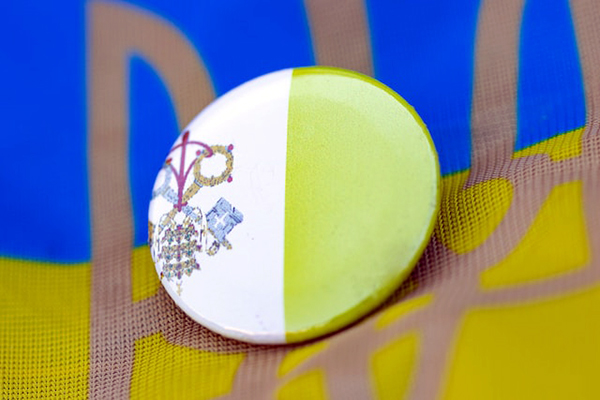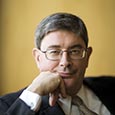The Vatican as peacemaker in Ukraine?
- GEORGE WEIGEL
A few days after Cardinal Matteo Zuppi's appointment as head of a Vatican "peace mission" to "help ease tensions in the conflict in Ukraine" (as Vatican News put it), a startling picture appeared on page A1 of the Washington Post.
 Photo by Marek Studzinski on Unsplash.
Photo by Marek Studzinski on Unsplash.
That graphic image illustrated just how daunting a task Cardinal Zuppi and the Vatican Secretariat of State face. For it was a satellite photo of Bakhmut, a city in eastern Ukraine under relentless Russian assault for months, and it depicted urban devastation comparable to that of Berlin in April 1945.
Add to this the Russian kidnapping of Ukrainian children, the rapes, murders, and other war crimes committed by Russian troops, and the ongoing, indiscriminate Russian missile and drone attacks on civilian targets in Ukraine, and any serious analysis of the war leads to one conclusion: This is not a symmetrical "conflict" in which mediation between contending parties is possible (as it was in Mozambique, where Zuppi and the Sant'Egidio Community worked to end a civil war). This is a completely asymmetrical situation, in which a genocidal aggressor is being resisted by a free people determined to defend their nation and its sovereignty.
Put simply: If Russia loses, it loses a war. If Ukraine loses, it loses Ukraine.
It is not clear that this fundamental asymmetry and its implications for a post-war peace have been fully grasped in the Holy See. Working in Rome earlier this month, I heard echoes of Vatican concerns that Ukrainian President Volodymyr Zelensky's demand for a withdrawal of all Russian forces from occupied Ukrainian territory would make a negotiated settlement difficult. That analysis seems to miss the crucial political point, which is that President Zelensky, for all his eloquence, is following the will of his people, not egging them on to unreasonable demands. Similar echoes were heard of Vatican concerns about the allegedly extreme positions on the war being taken by Poland and the Baltic states—as if there weren't reasonable concerns that any form of Russian victory in Ukraine would put those countries (and Moldova) next on Vladimir Putin's reverse-the-verdict-of-the-Cold-War shopping list.
This is not a symmetrical contest between morally and politically equal "actors."
Certain Vatican circles also seem determined to maintain ecumenical contacts with the Russian Orthodox Church, despite the obvious fact that that Church's leadership is owned lock, stock and barrel by the Kremlin—thus creating another asymmetry, in which Catholic churchmen "dialogue" with agents of Russian state power and Russian security service assets who appear under the guise of churchmen. This solicitude extends beyond Patriarch Kirill of Moscow and All Rus' (a KGB operative at the World Council of Churches headquarters in Geneva in his youth) and his new "foreign minister," Metropolitan Anthony, who is wholly a creation of Kirill's. It continues to embrace Anthony's predecessor, Metropolitan Hilarion, now deployed to Budapest, who took the occasion of his 20-minute visit with Pope Francis during the recent papal visit to Hungary to post a YouTube video promoting the obscene fiction that Putin's Russia is a defender of Christian civilization.
None of this bodes well for a Vatican "peace mission." It even raises the possibility that Vatican diplomacy, absent a recognition of the basic moral and political asymmetries in this brutal war, might make matters worse, with a misconceived and ill-executed "peace mission" contributing to the lie that there are equivalent parties in this conflict who must be brought together in a "mediation." That falsification of reality, underwritten by what some will perceive as the moral authority of the Holy See, could undercut Western resolve in supporting the aggrieved party in this conflict—Ukraine—for the sake of achieving what would inevitably be a temporary peace with the undoubted aggressor: Russia.
If this is not to happen, certain moves by the Vatican seem imperative.
First, the highest authorities of the Church should make clear that they understand the existential character of the conflict: This is not a symmetrical contest between morally and politically equal "actors." Rather, Russia's war on Ukraine is an unwarranted, illegal and genocidal aggression, against which Ukraine is engaging in necessary and legitimate self-defense.
Second, the Vatican should suspend all formal ecumenical contacts with Russian Orthodoxy until such time as the Patriarchate of Moscow demonstrates that it is an ecclesial body, not an instrument of Russian state power.
If Russia, in response to such clarifications (or for any other reason), impedes or refuses to cooperate with the Vatican's welcome humanitarian efforts to return Ukrainian children to Ukraine, the essential character of Putin's aggression will become undeniable. So will the prospects for a Holy See "peace mission" that can actually contribute to peacemaking.
 This is Meaghen Gonzalez, Editor of CERC. I hope you appreciated this piece. We curate these articles especially for believers like you.
This is Meaghen Gonzalez, Editor of CERC. I hope you appreciated this piece. We curate these articles especially for believers like you.
Please show your appreciation by making a $3 donation. CERC is entirely reader supported.

Acknowledgement
 George Weigel. "The Vatican as peacemaker in Ukraine?" Denver Catholic (May 31, 2023).
George Weigel. "The Vatican as peacemaker in Ukraine?" Denver Catholic (May 31, 2023).
Reprinted with permission from Denver Catholic.
The Author

 George Weigel is a Distinguished Senior Fellow of the Ethics and Public Policy Center in Washington, D.C. He is author of The Fragility of Order: Catholic Reflections on Turbulent Times; Lessons in Hope: My Unexpected Life with St. John Paul II; Evangelical Catholicism: Deep Reform in the 21st-Century Catholic Church; Witness to Hope: The Biography of Pope John Paul II; Roman Pilgrimage: The Station Churches; Evangelical Catholicism; The End and the Beginning: John Paul II—The Victory of Freedom, the Last Years, the Legacy; God's Choice: Pope Benedict XVI and the Future of the Catholic Church; Letters to a Young Catholic: The Art of Mentoring; The Courage to Be Catholic: Crisis, Reform, and the Future of the Church; and The Truth of Catholicism: Ten Controversies Explored.
George Weigel is a Distinguished Senior Fellow of the Ethics and Public Policy Center in Washington, D.C. He is author of The Fragility of Order: Catholic Reflections on Turbulent Times; Lessons in Hope: My Unexpected Life with St. John Paul II; Evangelical Catholicism: Deep Reform in the 21st-Century Catholic Church; Witness to Hope: The Biography of Pope John Paul II; Roman Pilgrimage: The Station Churches; Evangelical Catholicism; The End and the Beginning: John Paul II—The Victory of Freedom, the Last Years, the Legacy; God's Choice: Pope Benedict XVI and the Future of the Catholic Church; Letters to a Young Catholic: The Art of Mentoring; The Courage to Be Catholic: Crisis, Reform, and the Future of the Church; and The Truth of Catholicism: Ten Controversies Explored.




